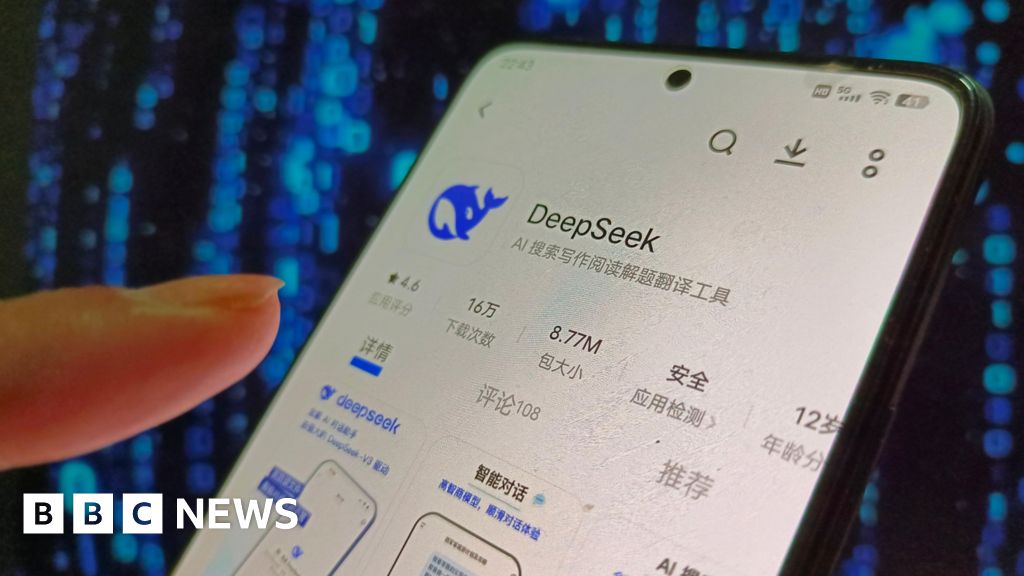


Chinese artificial intelligence (AI) app DeepSeek has overtaken ChatGPT and other rivals to become the top-rated free application on Apple’s App Store in the US, UK and China.
The app has surged in popularity since its launch in January, challenging the widely-held belief that America is the untouchable leader of the AI industry.
It is powered by the open-source DeepSeek-V3 model, which its researchers claim was developed for less than $6m – significantly less than the billions spent by rivals.
But this claim has been disputed by others in the AI space.
After DeepSeek-R1 was launched earlier this month the company boasted of “performance on par with” one of ChatGPT maker OpenAI’s latest models – when used for tasks such as maths, coding and natural language reasoning.
Silicon Valley venture capitalist and Donald Trump advisor Marc Andreessen described DeepSeek-R1 as “AI’s Sputnik moment”, in a reference to the first artificial Earth satellite that was launched by the Soviet Union in 1957.
Advanced chips power the training of AI models like ChatGPT and DeepSeek.
But since 2021 the US government has widened its restrictions on advanced chips being sold to China.
In order to continue their work without steady supplies of imported advanced chips, Chinese AI developers have shared their work with each other and experimented with new approaches to the technology.
This has resulted in AI models that require far less computing power than before. It also means that they cost a lot less than previously thought possible, which has the potential to upend the industry.
Shares in AI-related companies based in the US, such as Nvidia, Microsoft and Meta were down on Monday morning – and the development knocked European share prices.
ASML, the Dutch chip equipment maker, saw its share price tumble by more than 10% while shares in Siemens Energy, which makes hardware related to AI, plunged by 21%.
“This idea of a low cost Chinese version hasn’t necessarily been forefront, so it’s taken the market a little bit by surprise,” said Fiona Cincotta, senior market analyst at City Index.
“So if you suddenly get this low-cost AI model, then that’s going to raise concerns over the profits of rivals, particularly given the amount that they’ve already invested in more expensive AI infrastructure.”
And Singapore-based technology equity advisor Vey-Sern Ling told the BBC it could “potentially derail the investment case for the entire AI supply chain”.
But Wall Street banking giant Citi cautioned that while DeepSeek could challenge the dominant positions of American companies like OpenAI, issues faced by Chinese firms could hamper their development.
“We estimate that in an inevitably more restrictive environment, US’ access to more advanced chips is an advantage,” its analysts said in a report.
Last week, a consortium of US tech firms and foreign investors announced The Stargate Project, a company which is putting $500bn into AI infrastructure in Texas.
The company was founded in 2023 by Liang Wenfeng in Hangzhou, a city in southeastern China.
The 40-year-old, an information and electronic engineering graduate, also founded the hedge fund that backed DeepSeek.
He reportedly built up a store of Nvida A100 chips, now banned from export to China. Experts believe this collection – which some estimates put at 50,000 – led him to launch DeepSeek, by pairing these chips with cheaper, lower-end ones that are still available to import.
Mr Liang was recently seen at a meeting between industry experts and the Chinese premier Li Qiang.
In a July 2024 interview with The China Academy, Mr Liang said he was surprised by the reaction to the previous version of his AI model.
“We didn’t expect pricing to be such a sensitive issue,” he said.
“We were simply following our own pace, calculating costs, and setting prices accordingly.”
Additional reporting by Dearbail Jordan.